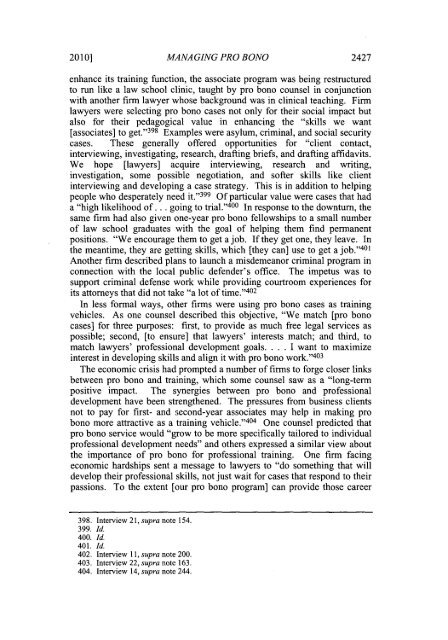Law for The Poor
Law for The Poor
Law for The Poor
Create successful ePaper yourself
Turn your PDF publications into a flip-book with our unique Google optimized e-Paper software.
2010] MANAGING PRO BONO<br />
2427<br />
enhance its training function, the associate program was being restructured<br />
to run like a law school clinic, taught by pro bono counsel in conjunction<br />
with another firm lawyer whose background was in clinical teaching. Firm<br />
lawyers were selecting pro bono cases not only <strong>for</strong> their social impact but<br />
also <strong>for</strong> their pedagogical value in enhancing the "skills we want<br />
[associates] to get." ' 398 Examples were asylum, criminal, and social security<br />
cases. <strong>The</strong>se generally offered opportunities <strong>for</strong> "client contact,<br />
interviewing, investigating, research, drafting briefs, and drafting affidavits.<br />
We hope [lawyers] acquire interviewing, research and writing,<br />
investigation, some possible negotiation, and softer skills like client<br />
interviewing and developing a case strategy. This is in addition to helping<br />
people who desperately need it." ' 39 9 Of particular value were cases that had<br />
a "high likelihood of... going to trial. '400 In response to the downturn, the<br />
same firm had also given one-year pro bono fellowships to a small number<br />
of law school graduates with the goal of helping them find permanent<br />
positions. "We encourage them to get a job. If they get one, they leave. In<br />
the meantime, they are getting skills, which [they can] use to get a job. 40 1<br />
Another firm described plans to launch a misdemeanor criminal program in<br />
connection with the local public defender's office. <strong>The</strong> impetus was to<br />
support criminal defense work while providing courtroom experiences <strong>for</strong><br />
its attorneys that did not take "a lot of time." 40 2<br />
In less <strong>for</strong>mal ways, other firms were using pro bono cases as training<br />
vehicles. As one counsel described this objective, "We match [pro bono<br />
cases] <strong>for</strong> three purposes: first, to provide as much free legal services as<br />
possible; second, [to ensure] that lawyers' interests match; and third, to<br />
match lawyers' professional development goals .... I want to maximize<br />
interest in developing skills and align it with pro bono work. '403<br />
<strong>The</strong> economic crisis had prompted a number of firms to <strong>for</strong>ge closer links<br />
between pro bono and training, which some counsel saw as a "long-term<br />
positive impact. <strong>The</strong> synergies between pro bono and professional<br />
development have been strengthened. <strong>The</strong> pressures from business clients<br />
not to pay <strong>for</strong> first- and second-year associates may help in making pro<br />
bono more attractive as a training vehicle." 404 One counsel predicted that<br />
pro bono service would "grow to be more specifically tailored to individual<br />
professional development needs" and others expressed a similar view about<br />
the importance of pro bono <strong>for</strong> professional training. One firm facing<br />
economic hardships sent a message to lawyers to "do something that will<br />
develop their professional skills, not just wait <strong>for</strong> cases that respond to their<br />
passions. To the extent [our pro bono program] can provide those career<br />
398. Interview 21, supra note 154.<br />
399. Id.<br />
400. Id.<br />
401. Id.<br />
402. Interview 11, supra note 200.<br />
403. Interview 22, supra note 163.<br />
404. Interview 14, supra note 244.

















